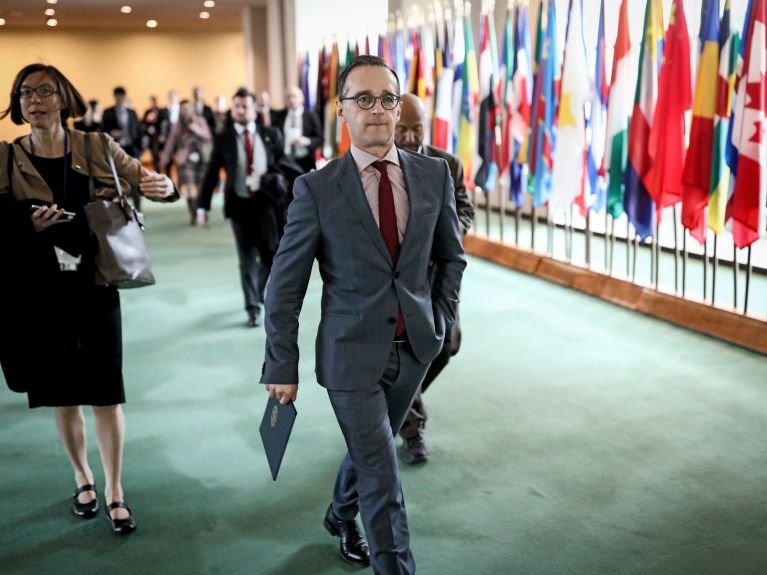A place in the most influential UN body
Germany has successfully applied for a non-permanent seat on the UN Security Council. deutschland.de explains why the candidature is so important.

The Federal Republic of Germany was last represented on the United Nations Security Council in the years 2011/2012. Germany is striving for a non-permanent seat in this important United Nations (UN) body for the seventh time – if you add together the terms served by the GDR and the Federal Republic. deutschland.de answers the most important questions on this subject.
Why is the UN Security Council so important?
The United Nations was founded after the Second World War to “save succeeding generations from the scourge of war”. The world organisation was intended to bring about an era of non-violent cooperation between states. The principal organ for achieving this, the heart of the United Nations, is the Security Council. It was given primary responsibility for “maintaining international peace and security”. It is therefore the highest UN body.
Are UN Security Council resolutions binding?
Yes. Unlike the resolutions of the General Assembly, in which all UN member states meet, the decisions of the Security Council are binding. According to international law, the world community must uphold its decisions. The resolutions of the General Assembly have a recommendatory character.
Dieses YouTube-Video kann in einem neuen Tab abgespielt werden
YouTube öffnenThird party content
We use YouTube to embed content that may collect data about your activity. Please review the details and accept the service to see this content.
Open consent formWhat decisions can the UN Security Council make?
If the Council comes to the conclusion that an incident threatens world peace, it can respond, for example, by imposing sanctions against a country, by sending troops or by authorising organisations like NATO to send troops.
How many members does the UN Security Council have?
It has five permanent members with veto rights. They are China, France, Russia, the United Kingdom and the United States. In addition, there are ten non-permanent members that each serve two years on the Council, but have no veto rights. They are chosen on the basis of a geographical formula: three countries from Africa, two each from Asia, Latin America and the Western Group and one from Eastern Europe.
What impact did Germany have during its membership in 2011/2012?
One major emphasis of German policy in the Council was its support for human rights, especially the rights of women and children in armed conflicts. But the right to clean water and sanitation was also high up on its agenda. In addition, Germany campaigned for peaceful conflict resolution and climate protection.
Quick facts
What would it like to emphasise this time?
In addition to the current crises and conflicts that make up by far the greatest part of the Security Council agenda, human rights and climate protection remain focal points of German UN policy. Conflict prevention and post-conflict reconstruction as well as the issue of global health and safety are also part of the German commitment.
Does Germany also have a chance of gaining a permanent seat in the Security Council?
In principle, yes. As the fourth largest contributor to the United Nations and the largest economy in Europe, the Federal Republic undoubtedly belongs to the circle of states that can and want to assume responsibility for world peace. However, despite an intense reform debate, which has lasted almost 25 years and in which Germany has been especially active with Brazil, India and Japan, it has not yet been possible to agree on a form of change. That is why observers do not currently expect Germany to take a permanent place at the Council’s famous horseshoe-shaped table in the foreseeable future.
Permanent Mission of the Federal Republic of Germany to the United Nations in New York

